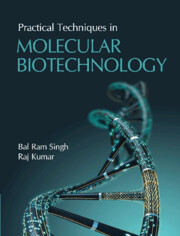3 - Enzyme Kinetics, Proteomics, and Mass Spectrometry
Published online by Cambridge University Press: 15 October 2021
Summary
Biochemical analysis techniques are a set of procedures and protocols used by scientists to analyze substances and the chemical reactions underlying life processes. For a complete biochemical analysis, the biomolecules such as proteins, lipids or carbohydrates must be isolated in their pure form from biological samples, characterized for structure–functions. Assays may involve spectrophotometric measurement, gel staining, densitometric analysis, determining the concentration and purity of the protein, and so on. The assays can be simple or tedious, based on the size, shape and net charge, in order to determine different properties and characteristics of the myriad biomolecules involved in different stages of life processes and to understand their role in the biochemical steps involved in maintaining the life.
Since biomolecules generally exist in very minute quantities in the cell, so, many a times it is not possible to employ chromatographic or other such methods to purify them in adequate quantities to carry out chemical and biological analyses. Hence, other approaches, such as proteomics have been devised so as to at least develop a general sense of the types of molecules, changes in their quantities (e.g. during growth), and identify their sequences using such sensitive techniques, such as mass spectroscopy, for comparison with known molecules, aiming at characterization of the biochemical processes in the cells by observing a few biomolecules at a time. This, in combination with the recent developments in understanding gene structures with their expressions, their genetic manipulations, bioinformatic tools, and large-scale automated analysis techniques, enable scientists to analyze cell process in greater depths.
One of the well-known biochemical processes that exists in every cell, and likely is responsible for the development, evolution, and maintenance of life is the enzymatic characteristics of most proteins, with some exception of RNA. Enzymes are used to assay biological activity of cells, tissues, organs, and even the whole organism or animal. Enzyme characteristics are useful tools for understanding structure–function relationship and biological activity at the molecular level. Therefore, a scientist interested in biochemistry generally has a solid knowledge of the principles and practice of enzyme function, including enzyme kinetics.
BASICS OF CHEMICAL KINETICS
Order and Molecularity
Chemical kinetics is a wonderful tool in understanding the behavior of a chemical reaction. To classify any chemical reaction, two parameters are very important: order and molecularity. Molecularity of any reaction is defined as a number of molecules that can alter the course of any reaction.
- Type
- Chapter
- Information
- Practical Techniques in Molecular Biotechnology , pp. 51 - 102Publisher: Cambridge University PressPrint publication year: 2022

